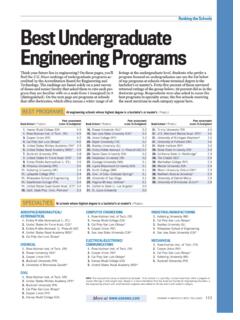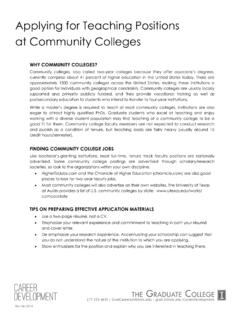Transcription of The Aims of Education - Stanford University
1 110 The Aims of Education Patrick Suppes Stanford University Some of you may feel that all that is original and interesting that can be said about the aims of Education has already been said by a stellar cast of philoso~ phers ranging from Plato to Dewey. I do not think that this is the case. It shall be my thesis that the subject should once again become a matter of vital concern -as it already is to many ordinary citizens. We can learn from the past, but we can also improve upon it. To provide both a historical and a conceptual framework for what I have to say, I consider Aristotle, Dewey, and Freud. Analysis of their views occupies much of this paper; my emphasis is not on scholarship, however, but on the use of the past in order to help us think more cogently about the present, and the future, of Education .
2 ARISTOTLE There is in Aristotle's Politics (1932/1967) a succinct statement of the aims of Education , but to understand Aristotle's thought on these matters it is necessary to examine a wider context, especially on the central themes of well-being or happiness, the nature of the intellectual and moral virtues, and the theory of right action, as developed in the Nichomachean Ethics (1941). The line of argument is subtle and difficult to layout in simple form. Indeed, it is not clear that the main themes are entirely coherent with each other. But in Aristotle's educational thought, there is a way of thinking and talking about human action that is of fundamental importance. By being brief, I shall not entirely do justice to the subtlety of Aristotle t S argument; but to some extent it is also my intention to reconstruct the argument, and therefore what I have to say might well an Aristotelian approach rather than a historically faithful account of what Aristotle himself said.
3 The tone is set by the opening words of the Ethics: Every art and every inquiry, and similarly every action and pursuit, is thought to aim at some good; and for this reason the good has rightly been declared to be that at which all things aim. Aristotle continues a few lines later: If, then. there is some end of the things we do, which we desire for its own sake (everything else being desired for the sake ofthis). and if we do not choose everything for the sake of something else (for at that rate the process would go on to infinity, so that our desire would be empty and vain), clearly this must be the good and the chief good. Will not the knowledge of it then have a great influence on life? For our present context it is appropriate to add that knowledge of this chief good will have a great influence on Education .
4 Concerning this highest of all goods or ends, Aristotle continues: Verbally there is very general agreement; for both the general run of men and people of superior refinement say that it is well-being [often translated happiness J and identify living well and doing well with flourishing [or being happy]; but with regard to what flourishing is they differ and the many do not give the same account as the wise. For Patrick Suppes the former think it is some plain and obvious thing, like pleasure, wealth, or honor; they differ, however, from one another -and often even the same man identifies it with different things, with health when he is ill, with wealth when he is poor; but, conscious of their ignorance, they admire those who proclaim some great ideal that is above their comprehension. (1095aI6ff.)]
5 A char~cteristic feature of Aristotle's thinking is exhibited in this argument about flourishing, or eudaimonia. A formal argument is given -an argument that Aristotle takes seriously. But he then goes on to make the point that the formal argument as such does not take us very far, because it does not make clear w hat the characteristics of flourishing or eudaimonia are. Aristotle departs from the formal line of argument to observe that there seem to be four sorts of lives that are chosen by men (1 095b 14-1 096al). One is the life of pleasure. This life, Aristotle says, is appropriate for slaves or beasts. The second sort of life is one which aims at honor. The meaning that Aristotle gives to this kind oflife makes it the object of politics. The third sort of life is one whose object is the pursuit of wealth, but, as Aristotle points out repeatedly in both the Ethics and the Politics, the pursuit of wealth is a means and not an end to the good life.
6 Finally, the fourth kind oflife is that of contemplation, whose proper object is theoretical knowledge, and in the latter part of the Ethics (Book X), Aristotle argues that it is the highest end. Aristotle resumes the formal argument by saying that to speak of flourish-ing or happiness as the chief good seems a platitude, but a proper account might be given if we could ascertain the function of man, for just as for a flute player, a sculptor, or any artist, and in general for all things that have a function or activity, the good .. is thoughtto reside in the function, so would it seem to be for man if he has a function. Have the carpenter. then, and the tanner certain functions and activities, and has man none? The analysis that Aristotle concludes with is that the proper function of man is "activity of the soul in accordance with virtue, and if there are more than one virtue, in accordance with the best and most complete" (1098a17).
7 The important point is that flourishing or happiness is not a state of feeling but an activity. Aristotle next asks the fundamental question, How is happiness to be acquired? His answer is that happiness is a matter of learning or Education . He makes this point in the most explicit way in discussing the acquisition of virtue when he states: It is also plain that none of the moral virtues arises in us by nature; for nothing that exists by nature can form a habit contrary to its nature. For instance, a stone which by nature moves downwards cannot be habituated to move upwards, not even if one tries to train it by throwing it up ten thousand times; nor can fire be habituated to move downward, nor can anything else that by nature behaves in one way be trained to behave in another. Neither by nature, then, nor contrary to nature do the virtues arise in us; rather we are adapted by our nature to receive them and are made perfect by habit.
8 (1103aI4) The next central question is the definition of virtue. As is to be expected, the first task is to determine the genus and the second the differentia. The genus must be one of three things, a passion, a faculty, or a disposition. After d~veloping his argument, not reproduced here, Aristotle concludes that the Virtues are dispositions or states of character (l106alO). Even more interesting 111 112 Aims of Education is his characterization of the differentia of virtue. It is a "state of character concerned with choice, lying in a mean, , the mean relative to us, this being determined by rational principle and by that principle by which the man of practical wisdom would determine it" (1107a1). Aristotle points out that a virtue is a mean with respect to its essence, but with regard to what is best and right it is an extreme.
9 Aristotle' s theory of virtue as the mean between extremes is a deep-running part of his conception of the good life and one to which he devotes a good deal of attention. The more technical passages in which Aristotle talks about the mean are written in a style characteristic of elementary Greek geometry. In his influential book on Aristotle, Sir David Ross (1949, pp. 195-96) expresses skepticism about the doctrine of the mean, but in intellectual spirit it is closely related to the modern doctrine of moral expectation as developed by utilitarians and Bayesian decision theorists. I do not want for a moment to make out that Aristotle is a utilitarian, but rather to point out that his emphasis on the mean uses a general intellectual apparatus that is hard to avoid and that is, in fact, too much missing from the ethical theory developed by Ross himself.
10 (For a rather formal development of these matters, see Suppes, 1973.) Aristotle devotes a good deal of attention to particular moral virtues -not just the four cardinal virtues of wisdom, courage, self-control, and justice emphasized by Plato in the Republic. In Book VI of the Ethics, Aristotle also discusses the intellectual virtues. These he also characterizes as states of the soul, and they are five in number: art, scientific knowledge, practical wisdom, philosophic wisdom, and intuitive reason. There is no opportunity in the present context to examine these five intellectual virtues, but their central role in the pursuit of happiness can be stated in a general way. Their function is to provide methods for knowing what is true and thus to provide the intellectual basis for the selection of the right rule.



